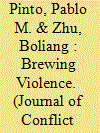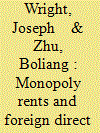| Srl | Item |
| 1 |
ID:
186335


|
|
|
|
|
| Summary/Abstract |
Two prominent features in current world affairs are the unprecedented level of global economic integration and the growing incidence of intrastate violence. We develop and test a novel argument linking global integration through foreign investment to intrastate armed conflict. The presence of multinational corporations in developing countries can cause market concentration, resulting in high rents. Disputes between governments and would-be challengers over the appropriation of these rents are likely to turn violent, increasing the incidence of armed conflict. State capacity mitigates this positive association between foreign investment and intrastate war. Strong states have the capacity to deter rebellions, address citizens’ demands through institutionalized mechanisms, and credibly commit to the peaceful resolution of conflicts. Using data from developing countries for over four decades and addressing potential endogeneity and selection biases, we find strong support for our hypotheses. Our findings have important implications for understanding the link between economic interdependence and conflict.
|
|
|
|
|
|
|
|
|
|
|
|
|
|
|
|
| 2 |
ID:
160573


|
|
|
|
|
| Summary/Abstract |
In the past two decades, much of foreign direct investment (FDI) in the primary sector has flowed to unconventional, politically risky destinations. This presents a puzzle for theories that emphasize the ex post immobility of—and hence high potential expropriation risk for—fixed asset investment. Existing theories overlook one critical aspect of fixed assets: large capital requirements and high sunk costs act as entry barriers, resulting in market concentration and strong firm incentive for monopoly rent extraction. Personalist dictatorships, we posit, provide an attractive institutional environment for fixed asset investors. In such systems, the control of key economic sectors by the families of leaders, combined with a lack of institutional constraints, facilitate rent-seeking activities. We find that personalist dictatorships receive significantly more foreign investment in the primary sector, and fixed-asset intensive industries in general, than other regimes. This study highlights the importance of accounting for heterogeneity among investors and political regimes to understand the politics of FDI.
|
|
|
|
|
|
|
|
|
|
|
|
|
|
|
|